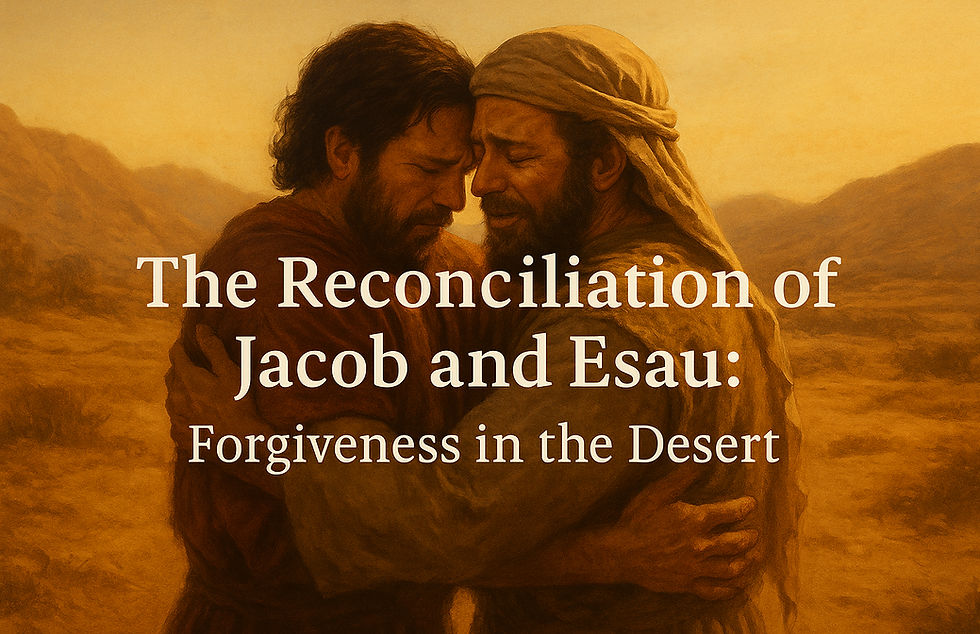Forgiving Those Who Are Hard to Forgive
- Bible Believing Christian

- Sep 8, 2025
- 3 min read

Forgiving Those Who Are Hard to Forgive
Forgiveness sounds noble until it touches the deepest wounds. It is one thing to forgive small offenses—unkind words, broken promises, or everyday irritations. But what about the unforgivable? What about betrayal by those closest to us, abuse, violence, even murder? The Bible does not shy away from these realities, and it offers a way of forgiveness that is neither shallow nor cheap.
The Weight of Real Wounds
Forgiveness in Scripture is not theoretical. Cain murdered his brother Abel. David destroyed Uriah’s family. The prophets were persecuted and killed. Jesus Himself was betrayed, mocked, beaten, and crucified. These are not petty wrongs but grievous sins. The call to forgive does not deny the weight of the wrong—it acknowledges it fully.
Joseph as a Witness to Forgiveness
Joseph’s story is an Old Testament picture of this challenge. His brothers did not merely tease him; they conspired to kill him, then sold him into slavery (Genesis 37:28). Years later, when he had the power to execute vengeance, Joseph instead said: “As for you, you meant evil against me, but God meant it for good in order to bring about this present result, to keep many people alive.” (Genesis 50:20, NASB).
Joseph’s forgiveness did not erase the evil. He named it clearly: “You meant evil.” Yet he trusted that God’s sovereignty was greater than his suffering. His example points us forward to a forgiveness even more costly and complete.
Jesus and the Cross
The ultimate model of forgiveness is Christ. Hanging on the cross, unjustly condemned, He prayed: “Father, forgive them; for they do not know what they are doing.” (Luke 23:34, NASB). This was not cheap grace. Jesus bore the full weight of sin, absorbing its penalty, and then offered forgiveness to His executioners.
Stephen, the first Christian martyr, echoed his Lord as stones rained upon him: “Lord, do not hold this sin against them!” (Acts 7:60, NASB). Here forgiveness is not sentimental—it is supernatural, born of the Spirit of Christ.
Misconceptions About Forgiveness
Forgiveness means excusing evil. Wrong. Scripture never excuses sin. Forgiveness names the evil honestly while refusing to let bitterness have the last word.
Forgiveness means trusting again immediately. Not always. Trust must be rebuilt; forgiveness does not erase wisdom.
Forgiveness means forgetting. No. God Himself says, “Their sin I will remember no more” (Jeremiah 31:34, NASB), but this is covenant language—choosing not to hold sin against us, not literal amnesia.
Theological Reflection
Forgiving the unforgivable is impossible apart from God’s Spirit. Human strength cannot release such deep wounds. But the gospel reframes even the worst wrongs. Just as Joseph could say, “God meant it for good,” so believers can trust that God redeems pain through Christ. Romans 8:28 reminds us: “And we know that God causes all things to work together for good to those who love God, to those who are called according to His purpose.”
Forgiveness does not erase justice—there may still be courts, consequences, and scars. But forgiveness releases vengeance to God: “Never take your own revenge, beloved, but leave room for the wrath of God, for it is written: ‘Vengeance is Mine, I will repay,’ says the Lord.” (Romans 12:19, NASB).
Christ-Centered Conclusion
To forgive those who have wounded us most deeply is not to condone their evil, but to trust Christ’s cross. He bore the sins of the world—including murder, abuse, and betrayal—and offers forgiveness even to His enemies. In Him, we find both the model and the power to release others, not because they deserve it, but because we have been forgiven.
Forgiveness is not easy, but it is possible. Like Joseph, we can name the wrong, and like Christ, we can extend grace. In doing so, we bear witness to a God who turns evil into good and death into life.


